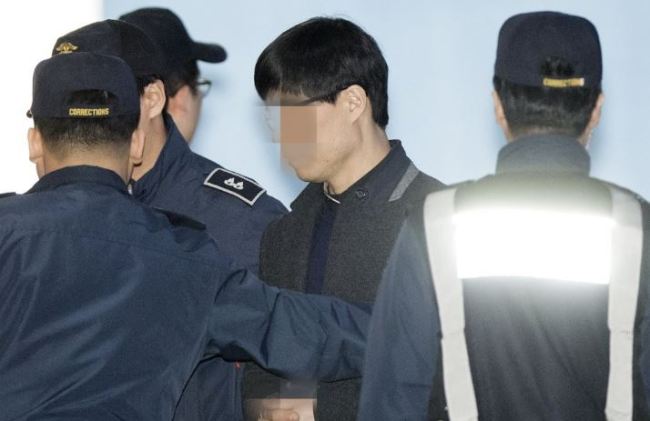More medical disputes are being negotiated since the enactment of a revised law that allows a state-run agency to begin mediation for medical malpractice without the consent of hospitals or doctors.
The “Shin Hae-chul law,” named after the singer who suddenly died following a controversial stomach surgery in 2014, went into effect in late 2016.
 |
The surgeon who did not provide proper care to singer Shin Hae-chul after an abdominal surgery in 2014 is arrested in this file photo. (Yonhap) |
According to the 2017 yearbook published by the Korea Medical Dispute Mediation and Arbitration Agency (K-Medi) on Monday, the agency provided counseling for 222,652 medical dispute cases in the five years to 2017. The number grew by 11.1 percent on an annual average.
Requests for the agency‘s mediation were made for 9,311 cases, marking an annual average gain of 14.7 percent.
The number of requests for mediation filed last year stood at 2,420, up 26.9 percent from a year ago.
Mediation procedures began for 47.6 percent of the cases for which requests were filed in the five years to 2017.
The ratio rose to 57.2 percent for mediation requests filed last year.
Following the enactment of the Shin Hae-chul law, mediation procedure began automatically on 383 medical disputes.
Aggravation of symptoms accounted for 21.8 percent of the appraised medical accidents, followed by infections (9.1 percent), delayed diagnoses (8.4 percent), organ damage (7.7 percent) and neural damage (7.1 percent).
The most common medical accidents involved surgeries (40.8 percent) in the division of medicine, preservation (20.7 percent) in dentistry, acupuncture (50.8 percent) in traditional medicine and medicine preparation (85.7 percent) in the pharmacy division.
Of the 4,035 cases that completed the mediation process in the five years to 2017, 2,634 cases were settled.
Both parties agreed to reconciliation plans drawn by the agency in 2,283 of the cases. A mediation panel ordered an adjustment on 583 of the cases.
The total compensation cost amounted to 24.18 billion won ($22.7 million), or an average of 9.18 million won per case.
By Kim So-hyun (
sophie@heraldcorp.com)








![[Today’s K-pop] Blackpink’s Jennie, Lisa invited to Coachella as solo acts](http://res.heraldm.com/phpwas/restmb_idxmake.php?idx=644&simg=/content/image/2024/11/21/20241121050099_0.jpg)